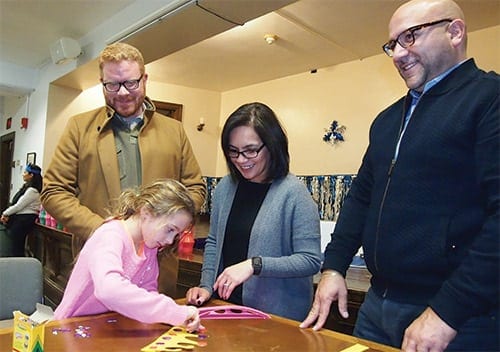Group advocates greater inclusion for Hub Latinos
Activists see disparities in nonprofit, gov’t sectors

In the basement room of the Connolly branch of the Boston Public Library, children decorate crowns in preparation for their celebration of El Dia de Los Reyes Magos, the January 6 celebration of the day the three kings visited the newborn baby Jesus.
Outside the library building, a band playing parrandas, traditional Puerto Rican Christmas season songs, warms up for a march led by teens with the Hyde Square Task Force, dressed as the three kings. The event, organized by the Task Force, underscores the organization’s role as an anchor for the local Latino community.

Teens from the Hyde Square Task Force lead a parranda — a musical parade featuring traditional Puerto Rican Christmas songs.
On the web
For more information on GBLN initiatives, visit: www.greaterbostonlatinos.org/.
When the Task Force was founded more than 20 years ago, it was one of many organizations serving the local Latino community. But as the community has grown in the Greater Boston area, the number of nonprofits led by Latinos in the area actually has declined. Major organizations including Centro Latino in Chelsea, the Hispanic Office of Planning and Evaluation and Oficina Hispana closed their doors in recent years. Other organizations, such as La Alianza Hispana, have downsized.
The Greater Boston Latino Network, a group of executive directors of leading local organizations, last week launched a new campaign to increase the presence of Latinos in decision-making positions in nonprofits and government. GBLN also is planning a January 15 “counter-inaugural event” at the Boston Public Library and will release a report on the status of Latino-led organizations as part of its efforts to support them.
While the organization continues to collect data on Latino-led organizations, members say they likely will conclude that their share of charitable dollars is not commensurate with Latinos’ share of the population in the Greater Boston area.
According to a 2011 report, Latino-led organizations receive just 1 percent of all charitable dollars donated in the United States. In Boston, the majority of charitable dollars here traditionally have gone to universities, hospitals, museums and other major institutions, while funding for community-based nonprofits has declined in recent years.
The funding struggle has GBLN members concerned.
“There are very unique services and attributes that Latino-led organizations have that other organizations don’t have,” said Marta Rivera, coordinator of the Greater Boston Latino Network. “We’re looking at how we can better help sustain these organizations.”
For one, Latino organizations tend to provide a wide range of services, while foundations have moved toward funding a narrower range of programs.
“We’re multiservice organizations,” said GBLN member Alex Oliver-Davila, executive director of Sociedad Latina, which provides educational and arts programing for teens. “In the Latino community, there are so many issues, you can’t work on just one. There’s no way a young person is going to perform academically if their family’s needs aren’t being met.”
Many local foundations that traditionally have funded youth program areas including civic engagement and youth organizing have shifted their focus to college preparation, a development that has made the funding environment more challenging for Latino-led organizations that service teens, says GBLN member Celina Miranda, executive director of the Hyde Square Task Force.
“Youth development on the whole has been more difficult to get funding for,” she said.
While the Task Force and other youth groups include educational enrichment services and offer students assistance with the college application process, Miranda says the skills teens learn in their arts programs also are critically important.
“It’s where teens get the opportunity to build their soft skills,” she said.
These are the sorts of abilities students build in Latino community-based organizations — communication, team work, collaboration — are valued in the working world, Miranda notes.
“They’re critical to being successful in the workforce.”
Miranda says the enrichment services many Latino-led organizations traditionally have provided remain sorely needed, despite the apparent indifference of many funders.
“It’s really about closing the opportunity gap,” she said. “Parents in the suburbs piece all this together. They’re able to pay for different programs. We’re trying to provide the same thing for inner-city youth.”
In addition to their advocacy on behalf of Latino-led nonprofits, GBLN members also are planning to continue their push for greater Latino representation in city and state government. While Latinos represent 20 percent of the city’s population, they make up just 9 percent of the municipal workforce. The report will be the second the group has released since it was founded in 2014.
“With continued under-representation at the local level and harmful policies coming at the federal level, now is a critical time to act,” said GBLN Steering Committee Member Vanessa Calderón-Rosado in a press statement. “This campaign will help ensure the voice of the Latino community is heard loud and clear and no longer marginalized.”
GBLN also is advocating on behalf of Latino parents, students and teachers in the Boston Public Schools, with initiatives to increase the number of Latino students applying to the city’s exam schools and a push for greater recruitment of Latino teachers. Currently just 10 percent of the city’s teachers are Latino, while Latino students make up 40 percent of the BPS population.


![Banner [Virtual] Art Gallery](https://baystatebanner.com/wp-content/uploads/2024/04/Cagen-Luse_Men-at-store-e1713991226112-150x150.jpg)



